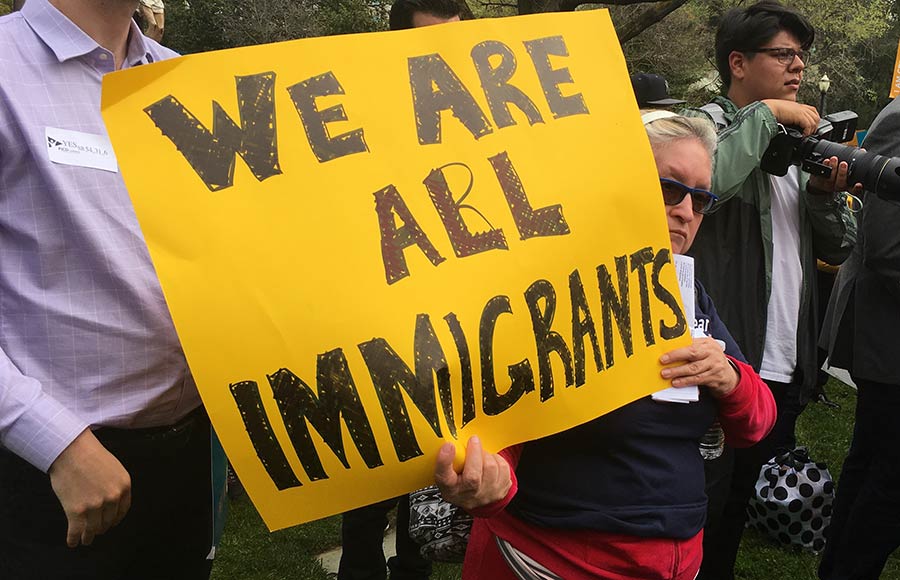Navigating the complexities of immigration law can be a daunting task, but understanding your rights and legal protections is crucial for securing a better future in the United States. This guide will provide an overview of the various immigration statuses, healthcare and education opportunities, employment rights, legal representation, and the path to citizenship.
As an immigrant, you are entitled to certain rights and protections under the law, regardless of your immigration status. It is important to be aware of these rights to ensure fair treatment and access to essential services.
Immigration Status and Legal Protections

Understanding your immigration status is crucial as it determines your legal rights and responsibilities within the country you reside in. Different immigration statuses provide varying levels of protection and access to services. Let’s delve into the common immigration statuses and their associated legal implications.
Permanent Residency
Permanent residency, often referred to as a “green card,” grants individuals the right to live and work permanently in a country. Permanent residents enjoy many of the same rights as citizens, including the ability to travel freely within the country, access healthcare and education, and own property.
They also have the right to apply for citizenship after meeting specific eligibility requirements.
Temporary Protected Status (TPS)
Temporary Protected Status (TPS) is a temporary immigration status granted to individuals from countries experiencing armed conflict, natural disasters, or other extraordinary conditions. TPS holders are authorized to live and work in the country for a specified period, typically renewable in increments.
They are protected from deportation and are eligible for certain benefits, such as work authorization and access to healthcare.
Asylum
Asylum is a legal status granted to individuals who have fled their home country due to persecution or a well-founded fear of persecution based on race, religion, nationality, political opinion, or membership in a particular social group. Asylees are granted protection from deportation and are eligible for various benefits, including work authorization, healthcare, and legal assistance.
Access to Healthcare and Education
![]()
Immigrants face unique challenges in accessing healthcare and education due to language barriers, cultural differences, and financial constraints. Understanding the available options and potential barriers can help immigrants navigate these systems effectively.
Healthcare Options
Immigrants have access to various healthcare options, including:
-
-*Public Programs
Medicaid and CHIP provide health insurance to low-income individuals and families, regardless of immigration status.
-*Private Insurance
Immigrants can purchase private health insurance through employers, the Health Insurance Marketplace, or directly from insurance companies.
-*Community Health Centers
These non-profit clinics offer affordable healthcare services to uninsured and underinsured individuals, including immigrants.
Educational Opportunities
Immigrant children are entitled to attend public schools regardless of their immigration status. Adults can pursue higher education through community colleges, universities, and adult education programs.
-
-*Public Schools
Immigrant children can enroll in public schools at any grade level, even if they have limited English proficiency.
-*Higher Education
Undocumented immigrants may face challenges in accessing financial aid, but there are scholarships and programs available to support them.
Challenges and Barriers
Immigrants may encounter barriers in accessing healthcare and education, such as:
-
-*Language Barriers
Limited English proficiency can make it difficult to communicate with healthcare providers and teachers.
-*Financial Constraints
Immigrants often have low incomes and may struggle to afford healthcare or higher education.
-*Immigration Status
Undocumented immigrants may fear accessing public services due to potential repercussions.
-*Cultural Differences
Differences in healthcare practices and educational systems can create misunderstandings and challenges.
Employment Rights and Protections
Immigrants have the right to work in the United States and are protected by the same labor laws as U.S.
citizens. This includes the right to fair wages, safe working conditions, and freedom from discrimination.
There are several laws that protect immigrants from discrimination in the workplace, including the Civil Rights Act of 1964, the Equal Employment Opportunity Act of 1972, and the Immigration Reform and Control Act of 1986.
If you believe you have been discriminated against at work, you can file a complaint with the Equal Employment Opportunity Commission (EEOC). The EEOC will investigate your complaint and may take action against your employer if it finds that discrimination has occurred.
Reporting Workplace Violations
If you experience any workplace violations, it is important to report them to your supervisor or human resources department. You can also file a complaint with the appropriate government agency, such as the Occupational Safety and Health Administration (OSHA) or the Wage and Hour Division of the U.S.
Department of Labor.
Seeking Legal Assistance
If you need help enforcing your employment rights, you can contact a legal aid organization or an immigration attorney. Legal aid organizations provide free or low-cost legal services to low-income individuals, and immigration attorneys can help you understand your rights and options under the law.
Legal Representation and Advocacy
Legal representation is crucial for immigrants facing legal challenges. It ensures they understand their rights, navigate complex legal systems, and receive fair treatment. Finding affordable legal services can be challenging, but resources exist to assist immigrants, including pro bono assistance from legal aid organizations and law school clinics.
Advocacy Organizations
Advocacy organizations play a vital role in supporting immigrants’ rights. They provide legal assistance, educate communities about immigration laws, and advocate for policy changes that protect immigrant rights. These organizations often collaborate with legal service providers to ensure immigrants have access to the resources they need.
Citizenship and Naturalization
U.S. citizenship is a legal status that grants an individual the rights and privileges of being a citizen of the United States. To become a U.S. citizen, an individual must go through a process called naturalization, which involves meeting specific eligibility requirements and completing an application process.
Eligibility Requirements
To be eligible for U.S. citizenship through naturalization, an individual must meet the following requirements:
- Be at least 18 years of age
- Be a lawful permanent resident (green card holder) for at least five years (or three years if married to a U.S. citizen)
- Be physically present in the United States for at least half of the five (or three) years immediately preceding the application
- Be able to read, write, and speak basic English
- Have a good moral character
- Have a basic understanding of U.S. history and government
Naturalization Process
The naturalization process typically involves the following steps:
- Filing an application (Form N-400) with the U.S. Citizenship and Immigration Services (USCIS)
- Attending a biometrics appointment
- Completing an interview with a USCIS officer
- Taking a naturalization test
- Attending a naturalization ceremony
Benefits of U.S. Citizenship
Becoming a U.S. citizen offers numerous benefits, including:
- The right to vote in elections
- The ability to hold public office
- The right to travel freely in and out of the United States
- The ability to sponsor family members for immigration
- The right to receive certain government benefits
Challenges and Barriers
Despite the benefits of U.S. citizenship, there are challenges and barriers that immigrants may face in obtaining citizenship. These challenges can include:
- The cost of the application process
- The language barrier
- The difficulty of meeting the eligibility requirements
- Discrimination and bias
Last Word
Understanding your rights and legal protections as an immigrant is essential for building a secure and fulfilling life in the United States. By accessing healthcare, education, and employment opportunities, and by seeking legal representation when needed, you can navigate the complexities of immigration law and fully participate in American society.
FAQ Corner
What are the different types of immigration statuses?
There are various immigration statuses, including permanent residency, temporary protected status, asylum, and student visas. Each status has its own set of rights and responsibilities.
Can undocumented immigrants access healthcare and education?
Undocumented immigrants may face limited access to healthcare and education, but there are programs and resources available to assist them. It is important to seek information and support from trusted sources.
What are my rights as an immigrant worker?
As an immigrant worker, you have the right to fair wages, safe working conditions, and protection from discrimination. You also have the right to join a union and bargain collectively.
How can I find affordable legal representation?
There are non-profit organizations and legal aid clinics that provide affordable or pro bono legal services to immigrants. You can also contact your local bar association for referrals.
What are the benefits of becoming a U.S. citizen?
U.S. citizenship offers numerous benefits, including the right to vote, travel freely, and sponsor family members for immigration. It also provides a sense of belonging and stability.



